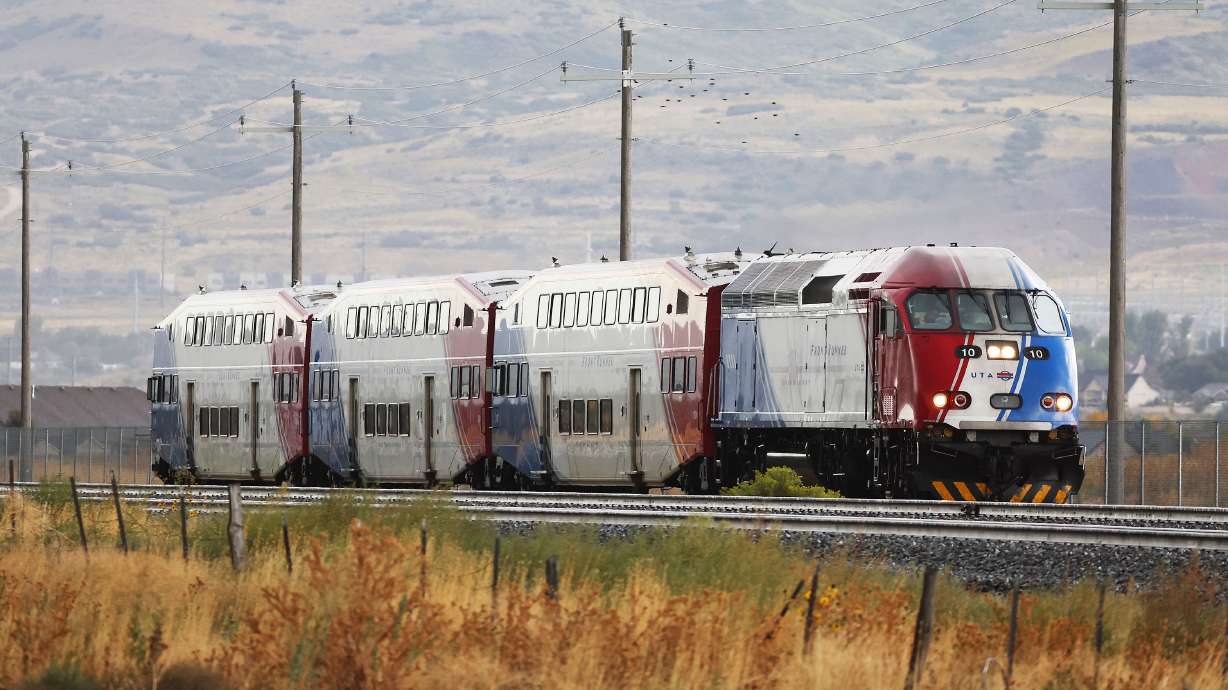Estimated read time: 4-5 minutes
This archived news story is available only for your personal, non-commercial use. Information in the story may be outdated or superseded by additional information. Reading or replaying the story in its archived form does not constitute a republication of the story.
BRIGHAM CITY — Three cities in Box Elder County recently voted to repeal a 15-year-old sales tax that had been used to help the Utah Transit Authority work toward extending FrontRunner service into the county sometime in the future; however, transit officials and local leaders say the vote shouldn't impact the future of those plans.
Residents in Brigham City, Perry and Willard all overwhelmingly voted to repeal a 0.25% mass transit sales and use tax during last month's election. Those results were affirmed last week. The taxes were adopted in 2008 to help UTA purchase property in its long-term plan to extend commuter rail service from Ogden north into Brigham City.
Brigham City Mayor DJ Bott says a recent change to a provision that the Utah Legislature approved a few years ago replaced the need for the local sales tax, which is why he views the vote as "benign" toward the future of the project.
Utah lawmakers approved a bill in 2018 that allows counties to collect a portion of sales tax for transit projects. Legislators approved tweaks to the law earlier this year that allow for other transportation projects as it sought to have more counties participate, despite concerns UTA officials brought up at the time that it could cut into the speed to fund projects.
Box Elder is one of several Utah counties that opted into implementing a 0.25% sales tax increase to help fund highways and public transit beginning on Oct. 1, according to the Utah State Tax Commission. That means a portion of sales tax in Brigham City, Perry and Willard could go toward the project anyway even if it is at a slower rate than before.
"Voting this was simply repealing the first quarter-cent so there wasn't a double taxation," Bott told KSL.com. "This was an easy one ... and, in that way, we were making sure we're competitive as far as sales tax with the counties around us."
UTA officials didn't object to the local tax repeals for this reason. In fact, UTA board trustee Beth Holbrook said she helped the three cities craft the proposition language that ended up on the ballot.
Where is the train?
Many Brigham City residents are still eager to have FrontRunner access, but the pace of the project has already slowed down since the sales tax was first implemented, Bott adds. He points out that many residents expected to have train service by now when they voted to approve the tax in 2008.
The holdup is primarily tied to creating a rail corridor between Ogden and Brigham City. Holbrook explains that UTA had initially hoped to reach an agreement with Union Pacific to share the existing corridor between Ogden and Brigham City.
The project also calls for five new stations north of its current northern terminus in Ogden. The agency already has about 10 acres of land set aside for a station in Brigham City, which will be located at 1100 South between I-15 and the Walmart in town.
When a Union Pacific agreement fell through a few years ago, UTA started a long and arduous process of creating its own rail corridor by acquiring land from the many private owners in between the two cities.
Holbrook told KSL.com Monday that she estimates the agency is about 35% complete with this effort, adding that UTA doesn't have the legal authority to impose eminent domain nor is it looking to.
"We've done all the major purchases that we anticipated, so now we're just working with private individual owners," she said. "We're just working with willing sellers."
The path forward
The switch in sales tax could complicate the effort moving forward. Holbrook says that UTA is expecting a dip in revenue beginning in January because it will receive a portion of the county tax as compared to the full 0.25% in three of its largest communities.
But UTA also recently gained access to the Utah Department of Transportation corridor preservation funds, which may help cover any losses in the tax shift, she adds. The agency anticipates using the money that it collects from both sources to buy the land needed to create this corridor.
It's unclear when this will be completed — it won't happen anytime soon. The hope remains that it will be completed before 2050, though Holbrook said the project could be accelerated if population trends force the state to look into ways to speed up the process.
That's something that suddenly changed the future of the Point of the Mountain by the Salt Lake-Utah county border, which is now in line to get a new FrontRunner station. The agency is also planning to expand service into southern Utah County in the future.
Bott knows many residents in his community have become skeptical about whether FrontRunner will ever move north into Brigham City based on these current hurdles. Yet many people he's spoken with agree the project is necessary for the future of the city and the growing region.
"There's still an equal amount, probably more, that understand that the connectivity to Salt Lake, Provo and Ogden through transit is an important component for them," he said.










